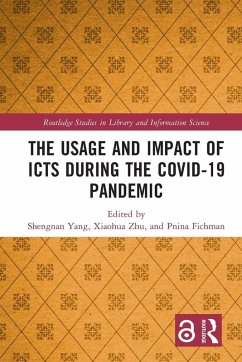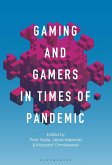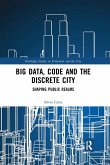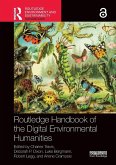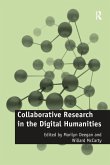The Usage and Impact of ICTs during the Covid-19 Pandemic
Herausgeber: Yang, Shengnan; Fichman, Pnina; Zhu, Xiaohua
The Usage and Impact of ICTs during the Covid-19 Pandemic
Herausgeber: Yang, Shengnan; Fichman, Pnina; Zhu, Xiaohua
- Broschiertes Buch
- Merkliste
- Auf die Merkliste
- Bewerten Bewerten
- Teilen
- Produkt teilen
- Produkterinnerung
- Produkterinnerung
This book takes a holistic view of the roles of ICTs during the pandemic through the lens of social informatics, as it is critical to our understanding of the relations between society and technology.
Andere Kunden interessierten sich auch für
![Comprehensive and Comparative Review of Covid-19 detection using various deep learning techniques Comprehensive and Comparative Review of Covid-19 detection using various deep learning techniques]() Hardik ModiComprehensive and Comparative Review of Covid-19 detection using various deep learning techniques18,95 €
Hardik ModiComprehensive and Comparative Review of Covid-19 detection using various deep learning techniques18,95 €![Cybersecurity Lessons from CoVID-19 Cybersecurity Lessons from CoVID-19]() Robert SladeCybersecurity Lessons from CoVID-1929,99 €
Robert SladeCybersecurity Lessons from CoVID-1929,99 €![Intelligent Computing Applications for COVID-19 Intelligent Computing Applications for COVID-19]() Intelligent Computing Applications for COVID-1969,99 €
Intelligent Computing Applications for COVID-1969,99 €![Gaming and Gamers in Times of Pandemic Gaming and Gamers in Times of Pandemic]() Gaming and Gamers in Times of Pandemic40,99 €
Gaming and Gamers in Times of Pandemic40,99 €![Big Data, Code and the Discrete City Big Data, Code and the Discrete City]() Silvio CartaBig Data, Code and the Discrete City59,99 €
Silvio CartaBig Data, Code and the Discrete City59,99 €![Routledge Handbook of the Digital Environmental Humanities Routledge Handbook of the Digital Environmental Humanities]() Routledge Handbook of the Digital Environmental Humanities61,99 €
Routledge Handbook of the Digital Environmental Humanities61,99 €![Collaborative Research in the Digital Humanities Collaborative Research in the Digital Humanities]() Collaborative Research in the Digital Humanities74,99 €
Collaborative Research in the Digital Humanities74,99 €-
-
-
This book takes a holistic view of the roles of ICTs during the pandemic through the lens of social informatics, as it is critical to our understanding of the relations between society and technology.
Produktdetails
- Produktdetails
- Verlag: Routledge
- Seitenzahl: 296
- Erscheinungstermin: 4. Oktober 2024
- Englisch
- Abmessung: 234mm x 156mm x 16mm
- Gewicht: 453g
- ISBN-13: 9781032139753
- ISBN-10: 1032139757
- Artikelnr.: 71547181
- Herstellerkennzeichnung
- Libri GmbH
- Europaallee 1
- 36244 Bad Hersfeld
- gpsr@libri.de
- Verlag: Routledge
- Seitenzahl: 296
- Erscheinungstermin: 4. Oktober 2024
- Englisch
- Abmessung: 234mm x 156mm x 16mm
- Gewicht: 453g
- ISBN-13: 9781032139753
- ISBN-10: 1032139757
- Artikelnr.: 71547181
- Herstellerkennzeichnung
- Libri GmbH
- Europaallee 1
- 36244 Bad Hersfeld
- gpsr@libri.de
Shengnan Yang is a PhD candidate in the Luddy School of Informatics, Computing, and Engineering at Indiana University in Bloomington. Her main areas of research focus on social informatics, information policy, and digital inequality. Xiaohua (Awa) Zhu is an Associate Professor at the School of Information Sciences at the University of Tennessee, Knoxville. Her research focuses on digital rights, information policy, social informatics, and academic libraries. Pnina Fichman is a Professor of Information Science at the Luddy School of Informatics Computing and Engineering, and the Director of the Rob Kling Center for Social Informatics at Indiana University, Bloomington. She has published five co-authored/edited books and over a hundred peer reviewed journal articles, conference papers, and book chapters about social informatics, trolling, information mediation, and communities of practice.
Introduction: Social Informatics in the Context of the COVID-19 Pandemic;
Part I: Governance; 1. Towards a Sociotechnical Framework for
Misinformation Policy Analysis; 2. Governing Privacy as Contexts Overlap
During Crisis; Part 2: Community; 3. A Social Informatics Approach to
Online Community of Practice of Art Recreation Challenge on Instagram
During COVID-19; 4. Treating a Viral Culture: Using Cultural Competency and
Social Informatics to Design Contextualized Information Literacy Efforts
for Specific Social Information Cultures; Part 3: Information Behavior; 5.
Information Behavior and Emotion Change in Public Health Emergency of
International Concern: A Case Study of Middle-Aged People; 6. Evolution of
Discussion Topics in Online Depression Self-Help Groups Before, During, and
After COVID-19 Lockdown in China; 7. Public Engagement With Science During
and about COVID-19 via Twitter; Part 4: Everyday life; 8. From Paperless
Offices to Peopleless Offices: The Effects of Enforced ICT Usage During
Covid-19 Lockdowns on Workplace's Information Practices; 9. Algorithmic
Assemblages, the Natural Attitude, and the Social Informatics of the
Pandemic Lifeworld
Part I: Governance; 1. Towards a Sociotechnical Framework for
Misinformation Policy Analysis; 2. Governing Privacy as Contexts Overlap
During Crisis; Part 2: Community; 3. A Social Informatics Approach to
Online Community of Practice of Art Recreation Challenge on Instagram
During COVID-19; 4. Treating a Viral Culture: Using Cultural Competency and
Social Informatics to Design Contextualized Information Literacy Efforts
for Specific Social Information Cultures; Part 3: Information Behavior; 5.
Information Behavior and Emotion Change in Public Health Emergency of
International Concern: A Case Study of Middle-Aged People; 6. Evolution of
Discussion Topics in Online Depression Self-Help Groups Before, During, and
After COVID-19 Lockdown in China; 7. Public Engagement With Science During
and about COVID-19 via Twitter; Part 4: Everyday life; 8. From Paperless
Offices to Peopleless Offices: The Effects of Enforced ICT Usage During
Covid-19 Lockdowns on Workplace's Information Practices; 9. Algorithmic
Assemblages, the Natural Attitude, and the Social Informatics of the
Pandemic Lifeworld
Introduction: Social Informatics in the Context of the COVID-19 Pandemic;
Part I: Governance; 1. Towards a Sociotechnical Framework for
Misinformation Policy Analysis; 2. Governing Privacy as Contexts Overlap
During Crisis; Part 2: Community; 3. A Social Informatics Approach to
Online Community of Practice of Art Recreation Challenge on Instagram
During COVID-19; 4. Treating a Viral Culture: Using Cultural Competency and
Social Informatics to Design Contextualized Information Literacy Efforts
for Specific Social Information Cultures; Part 3: Information Behavior; 5.
Information Behavior and Emotion Change in Public Health Emergency of
International Concern: A Case Study of Middle-Aged People; 6. Evolution of
Discussion Topics in Online Depression Self-Help Groups Before, During, and
After COVID-19 Lockdown in China; 7. Public Engagement With Science During
and about COVID-19 via Twitter; Part 4: Everyday life; 8. From Paperless
Offices to Peopleless Offices: The Effects of Enforced ICT Usage During
Covid-19 Lockdowns on Workplace's Information Practices; 9. Algorithmic
Assemblages, the Natural Attitude, and the Social Informatics of the
Pandemic Lifeworld
Part I: Governance; 1. Towards a Sociotechnical Framework for
Misinformation Policy Analysis; 2. Governing Privacy as Contexts Overlap
During Crisis; Part 2: Community; 3. A Social Informatics Approach to
Online Community of Practice of Art Recreation Challenge on Instagram
During COVID-19; 4. Treating a Viral Culture: Using Cultural Competency and
Social Informatics to Design Contextualized Information Literacy Efforts
for Specific Social Information Cultures; Part 3: Information Behavior; 5.
Information Behavior and Emotion Change in Public Health Emergency of
International Concern: A Case Study of Middle-Aged People; 6. Evolution of
Discussion Topics in Online Depression Self-Help Groups Before, During, and
After COVID-19 Lockdown in China; 7. Public Engagement With Science During
and about COVID-19 via Twitter; Part 4: Everyday life; 8. From Paperless
Offices to Peopleless Offices: The Effects of Enforced ICT Usage During
Covid-19 Lockdowns on Workplace's Information Practices; 9. Algorithmic
Assemblages, the Natural Attitude, and the Social Informatics of the
Pandemic Lifeworld

